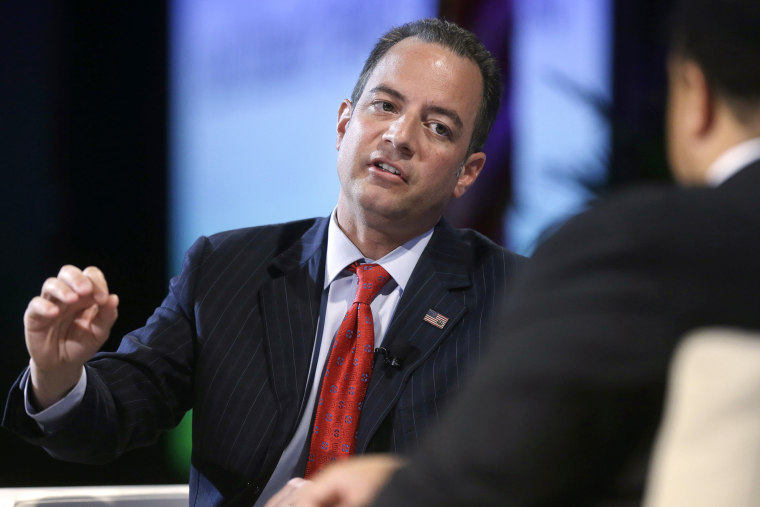It's not exactly a secret that the Republican Party is struggling to connect with minority communities, most notably Latino voters. GOP candidates up and down the ballot struggled badly with these constituencies in 2012, and recent polling evidence suggests the party is on track to do even worse in 2016.
With this in mind, CNN's Jake Tapper asked Republican National Committee Chairman Reince Priebus a good question yesterday.
TAPPER: Are you at all concerned that any of your candidates are crossing the line when it comes to talking about Latinos, to the point that it might actually cost you the White House? PRIEBUS: Well, look, I have said many times, the way you communicate and tone is very important. And, sometimes, it's not what you say, but it's how you say it. I think all of our moms have told us that. But, look, you know, all these candidates are going to have to account for their own mouths and their own words. And so, if you go back to 2012, you know, it wasn't anything another [what the] candidate said. Whether it be 'the 47 percent' or whether it be, you know, 'self- deportation' -- it was the nominee's words that came back into play.
This has been a common refrain in GOP circles in recent years. Republicans don't have a substantive problem, the theory goes, they have a rhetorical problem. As the party chairman said yesterday, "It's not what you say, but it's how you say it."
For those hoping the Republican Party continues to embrace a far-right platform, this has long been a guiding principle. Literally a few days after the 2012 elections, when Democrats benefited from a sizable gender gap, the Washington Post's Charles Krauthammer said there was no need for his party to consider changes to his policy agenda. Rather, the pundit said women would start voting Republican when the party's candidates present far-right ideas on women’s health and reproductive rights with greater “delicacy.”
A few months later, an RNC member told reporters, “We don’t need a new pair of shoes; we just need to shine our shoes.”
Priebus is obviously committed to this principle. To hear him tell it, if Mitt Romney were a better communicator, voters would have looked right past his platform and supported him in greater numbers. It was word choice, not policy proposals, that dictated the outcome.
The fact remains, however, that selling a rejected product in new packaging has its risks.
Let's not forget that Republican officials haven't always reached this conclusion. The now-infamous "Growth and Opportunity Project" released in early 2013 -- the so-called "autopsy" -- actually advised Republican policymakers to take substance seriously. Indeed, the RNC report actually concluded that when it came to issues like immigration, the party had little choice: it had to change its policy agenda.
Republican lawmakers clearly disagreed and instead moved even further to the right.
Priebus doesn't seem concerned. What's "very important," he said yesterday, is "the way you communicate and tone." But what about the belief that public policy and governing are "very important," too?
I don't doubt that it's easier for a party to move forward without doing any real, substantive work. Customers aren't buying the car you're selling? Slap on some paint, change your sales pitch, and hope for the best.
The RNC chairman appears to be telling his party that if they deliver the right words the right way, their problems will disappear. And who knows, maybe some voters are so disinterested in substance and policy outcomes that focusing solely on rhetoric will make a difference.
But I'm skeptical. Demagogic rhetoric certainly isn't doing the Republican Party any favors, but neither is its policy agenda. Many women are going to look askance at a party that's hostile towards contraception, reproductive rights, and pay-equity laws, no matter how GOP candidates phrase their positions. Likewise, many Latinos are going to move away from a mass-deportation party that's hostile towards immigration and birthright citizenship, even if they characterize these positions in the most pleasant way possible.
Spin, in other words, doesn't always trump substance, even if it seems like the easy way out. Two years ago, I argued that Republicans have problems that can't be fixed with sloganeering, media training, and “delicate” talking points. That hasn't changed.
